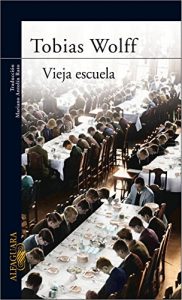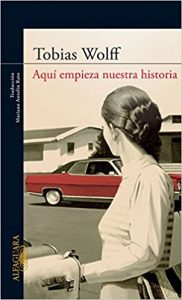Dirty realism has two aspects, the most nihilistic headed by Charles Bukowski o Peter John Gutierrez and the second loaded with greater claim connotations, represented by Tobias Wolff. The difference is a kind of total denial or, on the contrary, of a proposal to fight against disenchantment, to dispute against everything that limits us, including ourselves. But for this, Wolff is in charge of introducing us to a whole host of recalcitrant losers, perhaps just a reflection of what there is ...
However, in the end it's all about performances. Literature, whatever genre, in the end only tells a story. And the intention runs halfway between the author and the reader. From what the writer wants to elucidate from time to time between the dialogues of his characters and what the reader wants to understand, that space of interpretive freedom is generated. It can not be any other way.
It is true that sometimes, when defeat manifests itself so starkly that not even the best self-help guru could bring out the least positive of the tormented soul in turn, Tobias Wolff's characters are left with only the twisted fantasy of doom to escape. of the mismatch between what happens to them and the mediocrity of people who can still badly hide their unhappiness.
It happens then that in their fantasies and even in their delusions, it turns out that Wolff's characters end up being the most authentic of our jungle because they end up not disguising or filtering anything. And even so, Wolf manages to insert that critical intention that ends up reaching the reader's side with the greatest of certainties.
Top 3 Recommended Books by Tobías Wolff
This boy's life
In some book of Stephen King On the subject of writing, he exposed his particular childhood plagued by accidents, diseases and deficiencies. When you feel devotion to an author, those kinds of books between the autobiographical with a transforming point to mythologize the matter (it happens to all of us when we idealize our good times), they become exciting adventures to the why of the writer.
In this case Tobías Wolff also tells us about his childhood times in the transcript of his character. And the strange days of Wolff's childhood and adolescence appear with that crisp brilliance of adventure to later portray black on white, like a destiny written by something superior so that it is finally witnessed to a life on the edge.
There is much of the courage necessary not to succumb to the other side of the American dream, where the protagonists of the nightmares live that nobody wants to recognize in that booming United States after the trompe l'oeil. But there is also much of that necessary balance between excesses and hardships. Something of affection and humanity always resides in the desiccation. Because you can only be disenchanted when you have known the opposite, some piece of authentic happiness that perhaps in the middle of comfortable lives can never be found.
Old School
And if it is about addressing the writer's motives to end up being one, this novel is thrown into the open grave to the narrator's internal twists and turns, of the mirrors between reality and fiction, of the soul determined to undress before others to teach what is or perhaps what others want me to be ...
How far will a young writer be able to go to achieve the recognition of a consecrated author?Determined to fit in with his elitist school, the narrator has learned to blend in with his classmates and compete with them for a place in which to make his literary vocation come true. But along the way, he must learn to tell the truth about himself.
Wolff brings us the gaze of a young writer while asking us: Who are we? The person we think we are, the person we show others, or the person others imagine us to be? With the masterful prose and emotional subtlety that dazzled us in This Boy's Life, Tobias Wolff faces the blurred border between fact and fiction. A novel about the seductive nature of literature.
Here our story begins
Along with the other volume of stories Hunters in the snow, in these samples of Tobías Wolff's short narrative we find the perfect synthesis of his narrative. Conciseness in the background and brevity in the form but always double readings from the symbols and ideas outlined with a promptness that strips them completely for our morbid gaze.
Children who find in lies a way to restore meaning to the world around them, brothers who do not understand each other, couples who break up during a trip through the desert, a woman who spies on her neighbors, friends who embark on a journey hunting that can only go wrong or a soldier who is told that his mother has died. All the characters in these stories face everyday circumstances that are nonetheless extraordinary. At the peak of his literary career, Wolff demonstrates the miraculous power of a great story to provoke, surprise, and transform readers.



